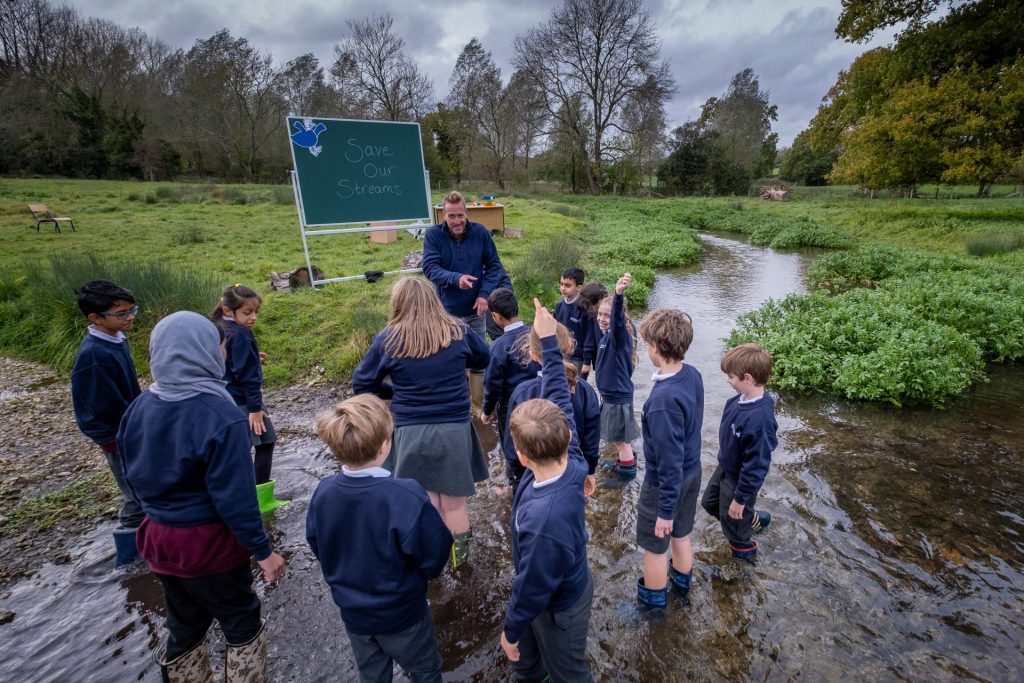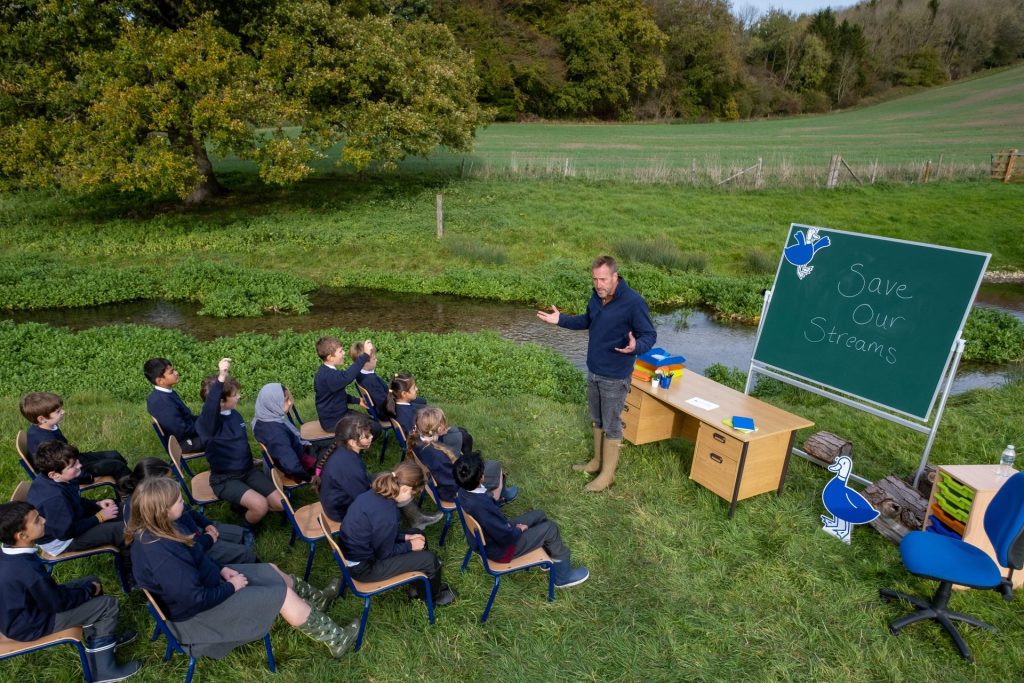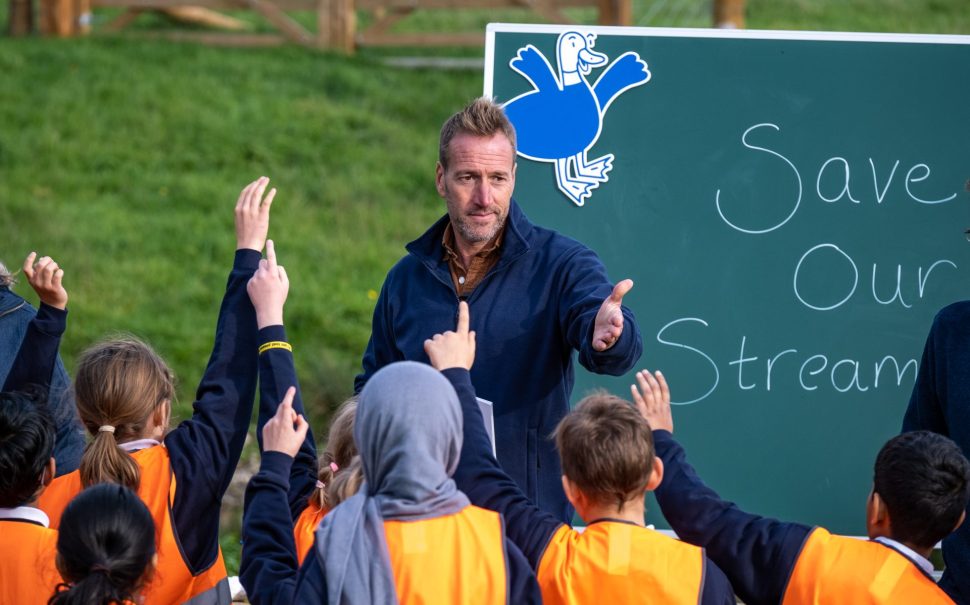Following one of the driest and hottest summers on record, and lower-than-average rainfall predicted this winter, water sources including the UK’s rare chalk streams, are under strain.
According to research, households across the East of England are not conserving water, with new research from Affinity Water, the UK’s largest water-only supplier, revealing that 36% of those in the region report using even more water than they did 12 months ago despite recent drought.
With those in the area admitting they have increased how much they are showering, watering plants and still leaving the tap running while brushing their teeth since the summer droughts, Affinity Water is re-launching its Save our Streams (SOS) initiative urging customers to save water, which in turn will save them money, and help to protect the UK’s delicate chalk stream ecosystems.
That’s why, adventurer Ben Fogle has joined forces with Affinity Water to launch the save our streams campaign to help customers save water, save money, and save our streams.
Ben Fogle said: “During my global adventures, I’ve seen how fragile habitats can come under threat.
“Our chalk streams have been described as England’s Great Barrier Reef. They are 10 x more endangered than both the Bengal Tiger and the Black Rhino, and as worthy of protection as anything I’ve seen on my travels.

“Sometimes we take the water coming out of our taps for granted, so learning how wasting water can affect some of our most precious ecosystems is important.
“I’m hoping Affinity Water’s Save Our Streams initiative will encourage people to change some of those habits that they’ve fallen into.”
Winter is a critical time for replenishing the sources of our drinking water and keeping water flowing through our chalk streams and rivers, but despite a few wet days in October, it is still drier than normal, and rainfall has been lower than average for the last 6 months.
Tap water in Affinity Water areas comes from the same groundwater sources that flow into our local rivers and streams. Therefore, the less water we waste at home, the more that can stay and support these environments.
Lynn McCarthy, SOS Campaign Director, Affinity Water said: “Save our Streams is not about stopping people using water; providing high quality drinking water to our customers is why we are here, but as the research there is an opportunity for us all to give more thought to how we use it.
“Making simple changes every day will have a huge collective impact on our streams, and people can also save a bit of money on their energy bills.
“We have had one of the driest summers on record, and despite us all believing it rains a lot in this country, rainfall has been below average for more than six months.
“Now is the right time for a campaign like Save our Streams to encourage children and their families to become the next generation
With 41% of adults in the East of England not knowing the environmental impact of wasting water has in the UK, Fogle joined children on the banks of the river Chess to help the next generation break the cycle and learn some water saving habits.
During the educational river dipping trip, Ben and his new classmates were able to ask experts from Affinity Water and the Chilterns Chalk Stream Project about water usage and
The fact that nearly three quarters (73%) of adults in the East of England don’t fully understand how the water cycle works demonstrates that a better understanding of where tap water comes from is fundamental to achieving a nationwide reduction in excessive use.
In addition to the big steps Affinity Water are taking to reduce water wastage; the company is encouraging households to do the same by taking simple steps to reduce the amount used. If everyone reduced their usage by 7.5% this year, a total of 17 mega-litres per day could be saved from going to waste, which is equivalent to 140 million cups of tea, 37 million pints of water, 262,500 baths of water and 8.4 Olympic swimming pools.
Saving water has financial benefits as well as ecological ones, with the regional research showing that saving money is the second most inspiring reason to save water (38%) behind protecting the environment (39%). To add to that, 52% were unaware that at least a fifth (17%) of a typical energy bill goes on heating water and 72% weren’t aware that shortening shower time by two minutes could save as much as £400 on the average energy bills.

With just over a quarter (28%) in the area fearing there could be a water shortage in the UK during the winter months, the need to educate and change water wasting habits are underlined. Now, Affinity Water is encouraging people to sign up to become a Stream Saver and take its water footprint quiz, find advice, and claim free water saving devices.
Affinity Water customers have some of the highest daily usage across the UK with some households using as high as 194 litres per person per day compared to the UK average of 145 litres per day. The provider’s own research has revealed that 49% of its customers admit to wasting water in their household and just 55% changed their behaviour during this summer’s droughts.
To help kick those water wasting habits and make conserving water second nature, no matter the weather, Affinity Water has compiled handy tips to start conserving water now:
· Save up to 30 litres everyday by spending just two minutes less in the shower. That’s the same as 168 cappuccinos.
· Save as much as 50 litres by using a water butt to collect rainwater for the garden. The same as 25 bottles of fizzy pop.
· Save up to 65 litres everyday by only running dishwashers and washing machines when they’re full and on ECO mode. That’s a full bath of water.
· Save 20 litres everyday by turning off the tap every time you brush your teeth. That’s four buckets of water per person per day.
· Save 120 litres every time you wash your car by using a bucket and sponge instead of a hose. That’s a whopping 530 cups of tea, going down the drain.
· Save up to 36 litres everyday by washing up in a bowl instead of under a running tap. That’s almost 444 pints of milk a week. More than a cow full!
Join us at https://www.affinitywater.co.uk/saveourstreams.

Join the discussion